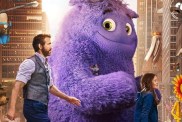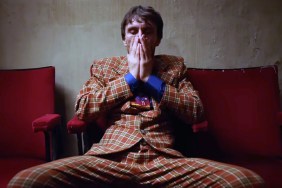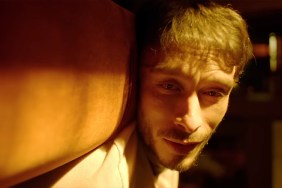Will Prince Charming find his happily ever after in DreamWorks Animation’s Shrek the Third? Charming (Rupert Everett) is certainly going to try if he has his way. Once he learns of King Harold’s fate, he attacks Far, Far Away with an army of fairy tale villains to seize the throne. It’s an all out war as Shrek and Charming battle it out for the top position at the kingdom..ComingSoon.net talked to Everett about reprising his role.
CS: What was it like to return for the third time?
Everett: It’s great! It’s the best job to have, to be honest; I feel it’s like a golden handshake. It’s a job that you can do all over the world wherever you are; you could be in Poland and they’ll hook you up via satellite to the studio in LA. It’s state of the art; you’ve seen it. It’s beautiful looking, the sea tones, how they’ve done water, the skin tones, the magic hour, how they’ve shown the sun rays it’s just sensationally beautiful and in that respect, it’s really a pleasure to take place in. Every time you go back, they’ve done something else, and they’ve got such an attention to detail that it’s a brilliant job. It’s not an impossible job, maybe if you were an actor starting out, maybe you’d be nervous ’cause you’re on your own acting you don’t have anyone to go to come up with a performance straight away. There’s no rehearsal, and you don’t investigate who your character is; you have to come up with it. And that’s like riding a bicycle; once you learn how to do it, you can do it. At that point, it’s a great job, it’s a really great job.
CS: How much did the script change in the years they worked on this?
Everett: They don’t change the story line, you sometimes go in and they’ve reworked something and they’ve refined rather than changed. It’s so carefully thought out; that’s what’s nice. In the old days, when filmmaking was less expensive, filmmaking was done like that, too; people would think about every frame of a movie and design and costume and everything. We can’t do that anymore, and film is so expensive; and mostly you don’t have any money for that. Occasionally, for example, Spielberg, you see a Spielberg film and the reason they look so extraordinary, I think, is because he has the money to have attention to every single detail. Most films are rushed. And this is like that they think about everything, and it’s a pleasure to be a part of.
CS: Is that you singing in this?
Everett: Yes.
CS: Did you have fun doing that?
Everett: Yeah, it was a lot of fun; it was lovely. That song is great.
CS: Did you do that several times?
Everett: Several days, actually; we did it one time, and then I went in and did it again. But, no, it was great. He’s a really funny character, really; he’s a villain, but he’s hopeless. He also never gets his chance in life, and he’s been brought up wrong; he’s been spoiled too much. I think he’s been spoiled a lot and he’s weak and he thinks it’s going to come naturally, and it doesn’t; and then he tries to make it come to him unnaturally. So in one sense, I have a lot of sympathy for him; he never gets his chance.
CS: They’re going to be making this into a musical; would you have any interest?
Everett: They are? No, I didn’t know. No, I don’t think I could. You have to be very good vocally to be able to sing in a musical 8 shows a week; I would collapse after the first night.
CS: Are you a fan of animation in general?
Everett: I love animation, yeah; but I love animated films. I think they shed more light on society than live action does really, to be honest. I think “Shrek” and “Simpsons” and “South Park” I think they tell you much more about the world than “Maid in Manhattan” or “Mission: Impossible.” Live action doesn’t seem to tell you anything; it’s all wannabe characters and fantasy relationships and political correctness. I think it’s really dwarfed.
CS: Why do you think that is?
Everett: Because political correctness means you can only smoke a cigarette if you’re the villain, right? Now, we know that’s not there’s good people, I’m not pro or against smoking, but you could be a saint and smoke; you can’t be in a movie. That’s just one example. But political correctness means nothing can happen that doesn’t have a moral outcome; it kills cinema dead because then everything becomes For example, if you have a couple, two kids in love, everything has to come out with some moral tie-in so that it’s acceptable politically. It’s totally uncreative.
CS: So why do you think you can do that in animation?
Everett: For some reason, particularly in this country, if you look at animation, it’s so much more edgy than anything you’d ever be able to do. You wouldn’t be able to have someone fart in a bath in a live action movie, it just wouldn’t happen. But for some reason, we stand one step back from a cartoon or something I don’t know what it is.
CS: Because the premise is comedy?
Everett: I don’t know, because we have very far-out comedies as well, I suppose, in live action but they go even further. You get “Something About Mary” where you have sperm in the hair, which is four or five degrees further and it doesn’t really have the same profundancy as something like this, because this actually does tell you about our culture.
CS: A social commentary?
Everett: A social commentary, that is just fantasy; but I don’t think live action in the old days really holds the mirror up to society very much.
CS: “South Park” can take a headline from Monday and put a show on the following Wednesday.
Everett: Well, that’s the other thing that’s very different from live action cinema and things like “Shrek,” we’re a lumbering machine we can’t come up with a response to what happened last week very fast.

CS: How was working with the new director? Did you feel like you knew the character better?
Everett: I always feel like I know more about the character than the director, so that’s nothing new. No, he’s really nice and they’ve both been very nice directors to work with; it’s really fun working on cartoons ’cause you have to enlarge everything that you say. It’s a very good lesson for acting actually, ’cause when you look at a cartoon character acting out a scene, there’s not one emotional beat in the image that’s not it’s all there. Everything’s a bit larger than if you were acting in a live action movie, and it’s fascinating, actually, cause they don’t miss out on one emotional beat of a sentence. So when you’re acting out a scene, you have to draw it out to be the same length as cartoons, and it’s very interesting for acting, I think. Cartoons can teach you a lot about acting.
CS: Where did you record this one?
Everett: This film, I was in Hong Kong, Berlin, I’ve been in London, I’d been in New York and I’ve been in Los Angeles.
CS: What’s it like recording this in Hong Kong?
Everett: It’s all done by satellite, so you’re on satellite.
CS: When you call and tell them you’re going to be away, what’s their reaction?
Everett: No, because it’s understood you have to make it…
CS: You have to make it work?
Everett: They have to make it work. Either you have to come back or they’ll make it work if they can’t. Most of the time, they want to be with you, so only towards the end will they do it by satellite.
CS: Have you seen yourself become more of a Prince Charming?
Everett: In my life? No, I don’t really identify myself with Prince Charming because the film isn’t really an allegory on Hollywood. I guess it’s about everyone getting their ‘happy ever after’ in their career, and I think we all feel a bit cheated out of certain things sometimes. So I feel a bit sympathetic to him on that. He goes in the wrong direction with it, life makes him angry and that’s a sad thing, because life does often make us furious. But again, that’s very profound in the movie, what makes us insurgent, what makes normal people into the villain. I think it’s a really good film in that sense; it has a childish area to it, and something that really works on you on another level for you.
CS: When you’re in the booth, do you have the script in front of you or does the director tell you where you are?
Everett: Yeah, they show you a big storyboard of the scene that they’ve written out so you know what’s going on.
CS: Do they feed you anything?
Everett: They do, you read the scene with the director and they play the other parts; but you have an idea on the storyboards what’s going on.
CS: Have you been shooting things all over the world? Is that why you were traveling?
Everett: Just now, I’ve been making a film. And before that, I wrote a book, an autobiography and I’ve been going around the world promoting that. And before that, I was writing it.
CS: What it’s like seeing your character in “Shrek”?
Everett: Yeah, apart from when you first hear your voice in your character, then you get used to it, and you just enjoy the movie. I saw this yesterday and just enjoyed it.
CS: What movie are you working on now?
Everett: I’m working on a movie called “St. Trinian’s,” which is a remake of an old English movie, a series of movies about an English girl’s school they’re remaking it.
CS: Did you enjoy the writing process of your book?
Everett: Very much, yeah. Not so much putting it out, but I enjoyed writing it; putting it out selling books is a lot harder than selling a movie. You know it takes a lot to get a book moving and you have to promote a lot, and I think selling books and book shops and just getting used to that was quite tough.
CS: But the actual writing process?
Everett: Yeah, I loved it.
CS: What’s the book about?
Everett: Me; it’s not really about me. It is an autobiography, but it’s really about the times I’ve been through more than myself.
CS: Why did you write it?
Everett: It just came about really by chance; I’d written a couple books before, novels and I’d always meant to start writing again. I’d made friends with a journalist, and she encouraged me to start writing down stories I had; and eventually, you go to an agent who took me to some publishers and it all just happened. And I wanted to take some time off from acting and it was a good punctuation mark in that way; I wrote it in the course of about a year and a half and I traveled a lot in that time. It’s very different from acting which is a job you do with a lot of people; when you’re a writer, which is a job you do on your own, I really loved that. I stayed in hotels and wrote in the mornings, and did fun stuff in the afternoons it was really nice.
CS: What’s the name of it?
Everett: It’s called Red Carpets and other Banana Skins.
CS: What happened to the Fairy Godmother in “Shrek 2”?
Everett: She did die.
CS: That’s why she wasn’t in this one; you kept looking at her picture.
Everett: I kept trying to bring her back; she was a great character, too.
CS: Did you voice a character for “Shrek the Halls”?
Everett: Yeah.
CS: What’s it like being a character in the Dylan Dog comic strip? Are they working on an animated feature?
Everett: They’re working on an animated feature? Are they? No, I didn’t hear about it.
CS: What’s it like having your likeness in the comic book?
Everett: It was good, we made one film off it called “Delamorte Dellamore” and we were going to make another one but it never got off the ground. It was great; it’s been great for me in Italy because the mythic comics, people love them.
CS: Do you read them yourself?
Everett: I have done them; they’re great. I’m not a comic reader, but they are great comics.
Shrek the Third opens in theaters on Friday, May 18.









